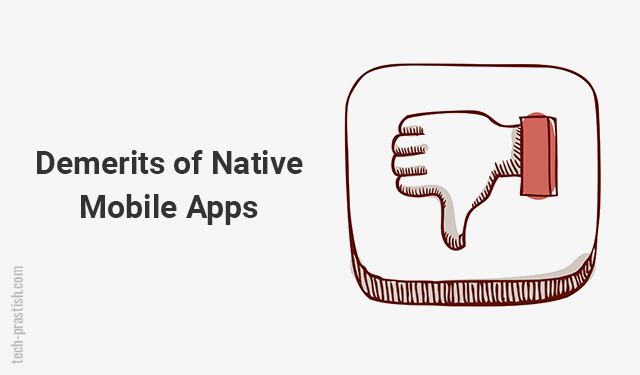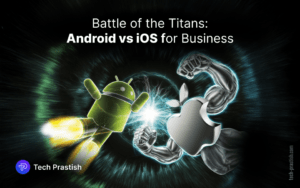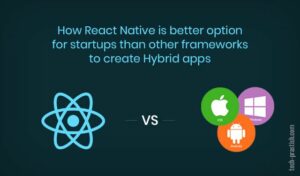![Native vs Hybrid App – Which One to Choose? [Answered]](https://www.tech-prastish.com/wp-content/uploads/2021/09/9.jpg)
The number of smartphone users in the United States has increased over the years. By 2025, 311.53 million Americans will be using smartphones.
More users means more potential customers for your business. Right?
So, building a mobile app can be a powerful addition to your marketing strategy.
Before you hire a mobile app development company, it’s important to learn what are the key differences between native and hybrid apps. Which one delivers the best performance? Whether you need to build a native app or hybrid app?
If you want to hire an expert to tell you all about it and help you make a decision to develop the app for you,, we are just a click away – Submit your query for mobile app development with us . We will make it quick and easy for you !
We are a premium mobile app development company, which has earned laurels in the global mobile app development scenario in helping businesses grow exponentially and reach the milestones they never before could.
In this post, we are going to shed light on everything you need to learn about the comparison between native and hybrid apps.
What is a Native Application?
A native mobile application is a software program created to run on a specific platform. Since it’s designed for one operating system, users can access all the device features. Usually, Android native apps are written in Java while iOS apps are written in Objective-C or Swift.
Which Apps Are Native?
Native apps are designed for a particular operating system (Android or iOS). Users can download them from Apple’s App Store or Google Play Store. Examples of native apps are Pokémon Go, Twitter, and Waze. An app created for iOS won’t work on an Android device.
Merits of Native Apps
Improved Performance
While developing native apps, mobile app developers carefully consider the human interface and quality guidelines; thus they demonstrate a high level of performance and good user experience.
For a great user experience, design of the user interface is critical. You may also want to look up the following article on our blog about mobile app user interface design – Top Five Mobile App Design Tips
Broad Functionality
Native apps are built for a single platform, thus users can enjoy all the features of the platform. You can also access the apps offline in case you get stuck somewhere with limited to no service.
The new software development kits (SDKs) allow developers to develop native apps with the latest features. Thus, users can access unique platform features after installing new updates.
Better Speed
Another benefit of building native apps is that they are faster and reliable. This is because the apps are built using the core programming languages supported by the platforms. Additionally, the apps have access to exclusive APIs, thus they can run smoothly.
Security
Native apps have amazing security features, which help prevent hackers from accessing your data.
You might remember Niantic’s security update to make Pokémon Go more secure for users. The layers of security they added were a warning after detection of cheat software and Google captcha requirements to access the accounts.
Maintain Aspect Ratio
Native apps support different screen sizes. In other words, they maintain the aspect ratio on their own based on the devices they run on.
Android and iOS provide Constraint Layout and Auto Layout features respectively for apps to maintain aspect ratio on different digital devices.
Demerits of Native Apps
No Flexibility
When it comes to developing native applications, mobile app developers have no flexibility for the platforms. They have to code for one platform (either iOS or Android) at a time.
Expensive & Time-Consuming Process
Not every platform requires the same set of codes. Imagine you have a native app for Android and need the same app for iOS. Your developer can’t reuse native code when developing the iOS app. Thus, they have to develop the app from scratch, which will make the process time consuming and expensive.
Frequent Updates
Difficulties with updates and maintenance is another concern. For instance, your developers fixed a bug in your native app or a new update is launching soon. It’s important to submit the update to the application store and notify users to install it. If a user doesn’t update the app due to any reason, they won’t get their issues fixed. Thus, chances are more they will uninstall it.
What is a Hybrid Application?
A hybrid mobile app is compatible with different platforms. If you have a hybrid app built for the iOS platform, you can easily run it on Android devices. It has elements of both native and web apps. You can install a hybrid app on your device, but technically, it’s a web app.
Mobile app developers use HTML, JavaScript and CSS for building hybrid apps.
Also Read- What Are The Differences Between HTML5 And (pre-5) HTML?
Merits of Hybrid Apps
Enhanced UX/UI
Hybrid apps offer a blend of web and native app features. They load content and graphics faster and adapt to different screens easily. Having a good UI means higher chances of your app to get approved in the app store.
Faster Development
Hybrid apps can be developed faster than native apps. This is because they need not to be built from scratch as native apps. Developers can reuse the code for different operating systems.
Cost-Effective
In hybrid apps, one code can be used for multiple platforms, thus helping developers to accelerate the development process. This can reduce overall app development costs.
Wider Market Reach
With a hybrid app, you can target users of different platforms. This means increased reach and more sales. In other words, building a hybrid mobile application can be a fast, cost-effective method to connect to your potential customers who are using different operating systems.
Easy Maintenance
Maintaining a hybrid app is easier; it’s like maintaining a web page. This is because there’s one codebase. Developers can change anything easily, and introduce new features to users.
Demerits of Hybrid Apps
Lower Speed
Hybrid apps are slower than native apps. You might remember Mark Zuckerberg’s statement in 2012 – “The biggest mistake we’ve made as a company is betting on HTML5 over native.”
After making the native app live, Facebook agreed that speed was one of the biggest advantages they have gained from developing on native iOS.
Limited Functionality
In hybrid apps, developers aren’t able to add all the features of digital devices. The apps usually rely on third-party plugins to provide users with additional features.
Problems With Graphics
Another disadvantage of hybrid apps is that they show problems with complex graphics, animations, etc. Although you can use various tools to improve the 3D graphics experience, still hybrid apps can’t give great performance as native apps.
Bugs
No matter how skilled your mobile app developers are, developing hybrid apps can increase chances of bugs. Since the code is written for multiple operating systems, debugging can be a difficult task.
Native vs Hybrid App
When deciding whether you need to build a native or hybrid app, consider the
following questions-
➢ What’s your target audience?
➢ Which platforms do your potential customers use?
➢ How much are you ready to spend on the app?
➢ What’s the deadline?
➢ What are the device features you want to use?
So, Which is Better – Native vs Hybrid App?
It depends on your needs. If you want to develop an app and enter the market quickly, a hybrid app is the way to go. Developers can use the same code for different platforms. However, hybrid apps can’t be as fast as native apps.
Things that make hybrid apps appealing are lower costs, easy updates and maintenance, and cross-compatible web technologies. But, in the long run, your developers need to spend more time fixing the performance related issues.
On the other hand, native apps can access features of the platform for which they are built. Moreover, they deliver a highly responsive user interface and better performance. But, you need to have a significant budget and timeline for developing a native app.
So, each mobile app development approach has its own pros and cons. But, building a native app can deliver the biggest benefits for your business’ bottom line.
Hope this post helped you have in-depth understanding about native vs hybrid apps, and know which one is right for you.
Still not sure what to build? Hire a mobile app developer, and build a custom mobile application for your business today.








